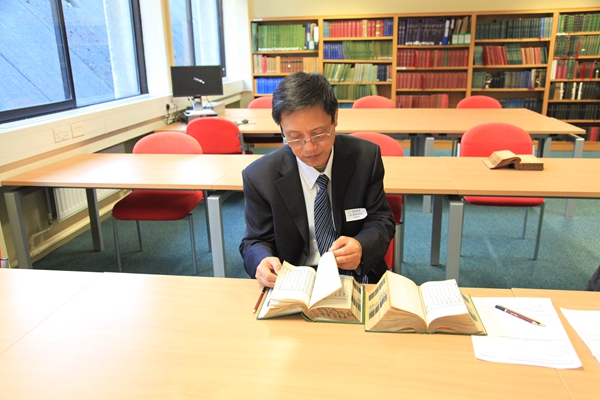 |
|
Guo Qi , professor at the Institute for Ancient Classics and Archives of Sichuan University, has compiled and published a book about Chinese scholar Zhu Xi.[Photo provided to China Daily] |
Zhu was described as the second most influential thinker in Chinese history, only after Confucius. He developed the metaphysical theories with regard to principle (li) and vital force (qi), and emphasized the process of the "investigation of things" and meditation as a method of self-cultivation.
"Zhu's basic thought pattern was used in various fields like politics, science and art, jointly forming a complete system which can be said to be the highest level of thoughts of his time," says Guo.
He also points out many thoughts in present Chinese society, like respecting the old and caring the young, valuing justice above material gains and keeping modest and humble, all have relations with Zhu's thoughts.
"Of course, Zhu's thoughts include some imperial ideas that are considered behind those of modern society, and we should drop them and inherit the good ideas," Guo adds.
Guo's understanding of Zhu's personality has changed since he started to prepare for this book. "I used to believe he is an outspoken and contentious person, and his personality offended many people, leading to his unsatisfying career as a government official. But through checking some newly-found letters of him, I discovered he also has a side of being hesitant, and making concessions to avoid trouble when he dealt with conflicts with members of his family clan, which is different from my impressions before."
His partner, Yin, on the other hand, finds that Zhu is much more popular in other countries than he had imagined.
"Zhu's works have long been spread to overseas countries, so we went to many places in Asia, Europe and America to collect materials. I remember when I gave a lecture about Zhu at Kyoto University in Japan, a scholar took a plane from Hokkaido to Kyoto to listen to my lecture in spite of the tiring trip. After my lecture, they also published my speech script on a high-level periodical in Japan. Therefore I feel they paid a lot of attention to Zhu's thoughts."
Zhu's works were spread to Korea and Japan in the 13th century, attracting a large number of scholars, like Korean philosopher Yi Hwang, to study them.
"Japan has a history of more than 800 years studying Zhu's thoughts. Japanese people respect Zhu very much, and their scholars' work to organize materials about Zhu has been done very well.
"Moreover, Zhu's thoughts were spread to Europe in the 18th century. Scholar Chan Wing-tsit from the United States has done research into Zhu's thoughts, published books about Zhu, and organized many activities to promote the development of studies on Zhu's thoughts," says Guo.
The study of Zhu's thoughts has become an international topic for scholars all around the world, according to Guo.
"I feel our study on him is very meaningful, not only to promote traditional Chinese culture, but also to promote the culture of all human beings," says Guo.
"We have studied Zhu, the historic figure for more than two decades, and still have enormous interest in him. The study on him has much academic value, and it is also related to our present life."